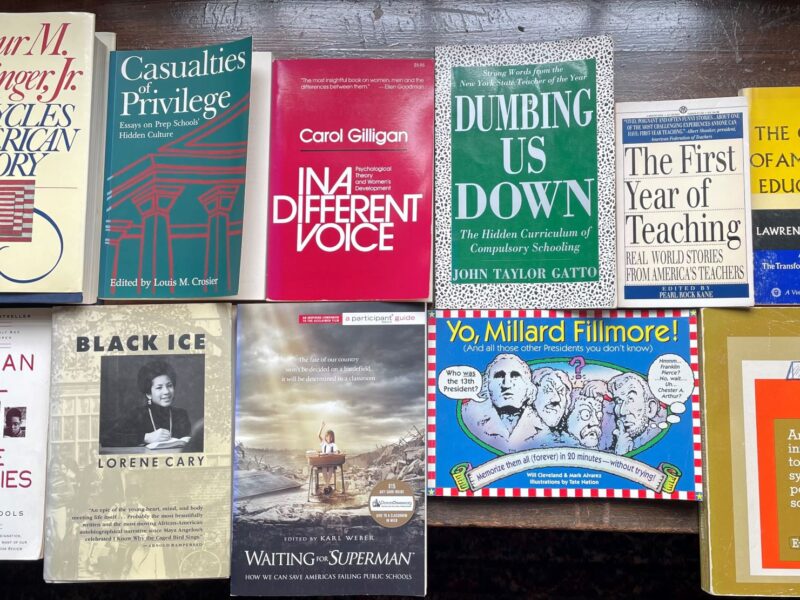GOOD KID/BAD KID
There is a scene in the film “Saturday Night Fever” where Frank, the older brother, returns home to the family after quitting the priesthood. His parents are beside themselves with disappointment. Younger brother Tony (John Travolta), is shocked by his brother’s fallibility. Mired in his inability to derive genuine self‑confidence from his passion for disco-dancing, Tony surprisingly shows that he is happy with his brother’s decision, “Because,” he reasons, “if you ain’t so good, then maybe I ain’t so bad.”
Some families seek Hyde because they have a teenage boy or girl acting in a rebellious fashion at home or as the underachiever at school. At the admissions interview, when we ask parents in this predicament to consider their own roles as contributors to the dynamic they now encounter, we sometimes receive a disturbing response that goes something like, “Well, our older son is a Dean’s List student at an Ivy League university, so our parenting is not the issue here.”
Such parents feel that because they’ve raised another son or daughter who appears to be successful, that they should be removed from scrutiny as part of the problem they now face with the child they have brought to the Hyde interview. (I sometimes can’t resist the temptation to tweak them with: “So, how do you know for sure that this kid you’ve brought here today isn’t the true reflection of your parenting and that maybe you just got inexplicably lucky with the Yalie?”)
The Good Kid/Bad Kid parent typically perceives value in a character development program for the “off-track” child who is not doing well but is reluctant to apply it to the on-track child who is the “apple” of Mom’s or Dad’s eye. The “good kid’s” success sometimes buys him/her immunity from attitudinal scrutiny. The “bad kid,” once enrolled at Hyde, may perceive that Mom and Dad are only paying lip service to this character “stuff” the school is espousing. He may also sense a latent hypocrisy at work: The “bad kid” knows that his “good kid” brother has some very negative attitudes and perhaps even clandestine illicit behaviors, but, because he’s successful, Mom and Dad either don’t see these attitudes or don’t want to see them. Sometimes the parents are oblivious to this hypocrisy, but their children ‑ both “good” and “bad” ‑ read it loud and clear and intuitively act in accordance with it.
The good kid realizes that he can maintain substantial affection and adulation (sometimes even material reward) by carefully staying three or four jumps ahead of the bad kid. He may not be any closer to his personal best or unique potential than the bad kid is, but he will remain free of parental scorn. The bad kid, on the other hand, is faced with a seemingly perpetual lifetime sentence of comparison with his good sibling, where he will never be better than second best. He then realizes that there is one foolproof way for him to maintain his parents’ attention: by acting out as the bad kid in royal fashion. (Although the masculine pronoun is used here, the Good Kid/Bad Kid archetype is definitely gender-neutral!)
New Hyde parents sometimes buy into Hyde’s belief in character and fulfillment because they genuinely see it as a better way for the bad kid. (Not to mention, as necessary prerequisite to being admitted at Hyde.) However, they also may fail to see that the philosophy also applies to the good kid. There is a hypocrisy inherent in this double-standard, one that says to both kids: “We will only require you to address your character when you’re having problems.”
In what may be a touch of irony, it is not at all uncommon for the good kid/bad kid roles to reverse themselves ten years or so down the road. The good kid can have problems once he or she realizes that life has a different set of standards than school or home, while the bad kid may rise to the top because of what was learned in facing the problems he or she had as a youth. After all, the one thing the bad kid did learn is one of the most useful skills in life: How to make a comeback from failure. Too often the good kid has been taught to avoid any circumstances that could so much as risk failure. (e.g., In the interest of protecting a grade point average, the good kid might be induced to drop an especially difficult course, thereby forfeiting the potential value gained by facing the challenge of that course.) Therefore, the good kid may never have the opportunity to learn how to make a “comeback” from failure.
Sometimes we encounter the well‑intentioned sympathetic parent who says, “Johnny needs a boarding school environment where he can get out of the shadow of his superstar brother. After all, his brother has been a tough act to follow.” On the surface, this reasoning appears sound. However, I have come to conclude that perhaps the only thing worse than a tough act to follow is… an easy act to follow. Sometimes the first child can be a living hell for the family and for teachers. In this case, the second child may be heaped with congratulations for doing nothing more than simply acting normal or for not being as bad as the other brother or sister. This child learns that it is not necessary to pursue personal excellence, it is only necessary to remain a few jumps ahead of his or her off-track sibling. Sometimes the good kid will be less equipped for the future than the bad kid, who has at least been out experimenting with different types of behavior.
At Hyde, we believe that who kids are matters more than what they can do. And the way to practice this belief is to value attitude over aptitude, effort over ability, and character over talent. Any family or school that truly believes and practices this philosophy is unlikely to get too hung up on the good and bad thing.
Next: Warped Sense of Opportunity
Onward, Malcolm Gauld


